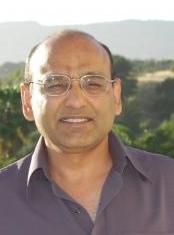Tutorial: Information Diffusion In Social Networks: Observing and Affecting What Society Cares About
Divyakant Aggrawal - UC Santa Barbara
Ceren Budak - UC Santa Barbara
Amr El Addabi - UC Santa Barbara
With hundreds of millions of users worldwide, social networks provide great opportunities for social connection, learning, political and social change, as well as individual entertainment and enhancement in a wide variety of forms. Because many social interactions currently take place in online networks, social scientists have access to unprecedented amounts of information about social interaction. Prior to online networks, these investigations required resource-intensive activities such as random trials, surveys, and manual data collection to gather even small data sets. Now, massive amounts of information about social networks and social interactions are recorded. This wealth of data can allow social scientists to study social interactions on a scale and at a level of detail that has never before been possible. In addition to providing a platform for scientists to observe social interactions in large scale, online social networks are also changing the very nature of social interactions. People now have ready access to almost inconceivably vast information repositories that are increasingly portable, accessible, and interactive in both delivery and formation. Basic human activities have changed as a result, and new possibilities have emerged. For instance, the process by which people locate, organize, and coordinate groups of individuals with shared interests, the number and nature of information and news sources available, and the ability to solicit and share opinions and ideas across various topics have all undergone dramatic change with the rise of social networks.
Social networks have already emerged as a significant medium for the widespread distribution of news and instructions in mass convergence events such as the 2008 U.S. Presidential Election, the 2009 Presidential election in Iran, and emergencies like the landfall of Hurricanes Ike and Gustav in the fall of 2008. Use of social networks such as Facebook and Twitter has also been noted as providing great ease during the recent demonstrations in Middle East. In light of these notable outcomes, understanding information diffusion over online social networks is a critical research goal. This greater understanding can be achieved through data analysis, the development of reliable models that can predict outcomes of social processes, and ultimately the creation of applications that can shape the outcome of these processes. In this tutorial, we aim to provide an overview of such recent research based on a wide variety of techniques such as optimization algorithms, data mining, data streams covering a large number of problems such as influence spread maximization, misinformation limitation and study of trends in online social networks.
Speakers:
Divyakant Aggrawal - UC Santa Barbara
 Divyakant Agrawal is a Professor of Computer Science at the University of California at Santa Barbara. His research expertise is in the areas of database systems, distributed computing, data warehousing, and large-scale information systems. Dr. Agrawal served as the Chair of Computer Science Department at UCSB from 1999 to 2003. From January 2006 through December 2007, Dr. Agrawal served as VP of Data Solutions and Advertising Systems at the Internet Search Company ASK.com. Dr. Agrawal has also served as a Visiting Senior Research Scientist at the NEC Laboratories of America in Cupertino, CA from 1997 to 2009. During his professional career, Dr. Agrawal has served on numerous Program Committees of International Conferences, Symposia, and Workshops and served as an editor of the journal of Distributed and Parallel Databases, the VLDB journal and currently serves on the editorial boards of the Proceedings of the VLDB and ACM Transactions on Database Systems. He recently served as the Program Chair of the 2010 ACM International Conference on Management of Data and served as the General Chair of the 2010 ACM SIGSPATIAL Conference on Advances in Geographical Information Systems. Dr. Agrawal organized an NSF Workshop on the Science of Cloud Computing in March 2011. He has published 300+ recentlysearch manuscripts in prestigious forums on wide range of topics and has advised more than 30 Doctoral students during his academic career. Recently, Dr. Agrawal has been recognized as an ACM Distinguished Scientist. His current interests are in the area of scalable data management and data analysis in Cloud Computing environments, security and privacy of data in the cloud, and scalable analytics over social networks data and social media.
Divyakant Agrawal is a Professor of Computer Science at the University of California at Santa Barbara. His research expertise is in the areas of database systems, distributed computing, data warehousing, and large-scale information systems. Dr. Agrawal served as the Chair of Computer Science Department at UCSB from 1999 to 2003. From January 2006 through December 2007, Dr. Agrawal served as VP of Data Solutions and Advertising Systems at the Internet Search Company ASK.com. Dr. Agrawal has also served as a Visiting Senior Research Scientist at the NEC Laboratories of America in Cupertino, CA from 1997 to 2009. During his professional career, Dr. Agrawal has served on numerous Program Committees of International Conferences, Symposia, and Workshops and served as an editor of the journal of Distributed and Parallel Databases, the VLDB journal and currently serves on the editorial boards of the Proceedings of the VLDB and ACM Transactions on Database Systems. He recently served as the Program Chair of the 2010 ACM International Conference on Management of Data and served as the General Chair of the 2010 ACM SIGSPATIAL Conference on Advances in Geographical Information Systems. Dr. Agrawal organized an NSF Workshop on the Science of Cloud Computing in March 2011. He has published 300+ recentlysearch manuscripts in prestigious forums on wide range of topics and has advised more than 30 Doctoral students during his academic career. Recently, Dr. Agrawal has been recognized as an ACM Distinguished Scientist. His current interests are in the area of scalable data management and data analysis in Cloud Computing environments, security and privacy of data in the cloud, and scalable analytics over social networks data and social media.
Ceren Budak - UC Santa Barbara
 Ceren Budak is currently a PhD Candidate at the Department of Computer Science, University of California Santa Barbara. Her research interests lie in the area of information diffusion in social networks. Her recent works in this area have employed various techniques such as optimization algorithms, data stream analysis and data mining.
Ceren Budak is currently a PhD Candidate at the Department of Computer Science, University of California Santa Barbara. Her research interests lie in the area of information diffusion in social networks. Her recent works in this area have employed various techniques such as optimization algorithms, data stream analysis and data mining.
Amr El Addabi - UC Santa Barbara
 Amr El Abbadi is currently a Professor in the Computer Science Department at the University of California, Santa Barbara. He received his B. Eng. in Computer Science from Alexandria University, Egypt, and received his Ph.D. in Computer Science from Cornell University in August 1987. Prof. El Abbadi is an ACM Fellow. He has served as a journal editor for several database journals, including, currently, The VLDB Journal. He has been Program Chair for multiple database and distributed systems conferences, most recently SIGSPATIAL GIS 2010 and ACM Symposium on Cloud Computing (SoCC) 2011. He has also served as a board member of the VLDB Endowment from 20022008. In 2007, Prof. El Abbadi received the UCSB Senate Outstanding Mentorship Award for his excellence in mentoring graduate students. He has published over 250 articles in databases and distributed systems.
Amr El Abbadi is currently a Professor in the Computer Science Department at the University of California, Santa Barbara. He received his B. Eng. in Computer Science from Alexandria University, Egypt, and received his Ph.D. in Computer Science from Cornell University in August 1987. Prof. El Abbadi is an ACM Fellow. He has served as a journal editor for several database journals, including, currently, The VLDB Journal. He has been Program Chair for multiple database and distributed systems conferences, most recently SIGSPATIAL GIS 2010 and ACM Symposium on Cloud Computing (SoCC) 2011. He has also served as a board member of the VLDB Endowment from 20022008. In 2007, Prof. El Abbadi received the UCSB Senate Outstanding Mentorship Award for his excellence in mentoring graduate students. He has published over 250 articles in databases and distributed systems.
















